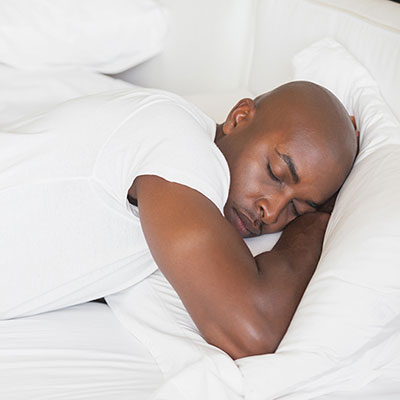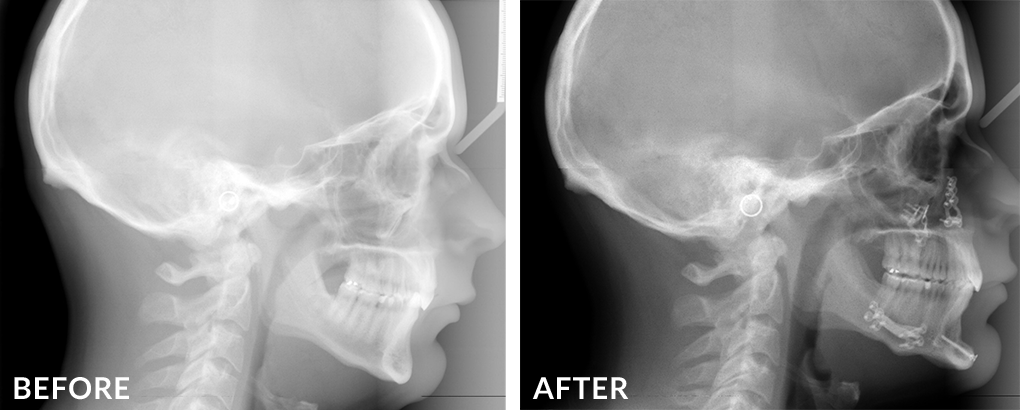
The straightest, whitest teeth.
Sleep Apnea

Are you drowsy during the day with no explanation? Do you snore loudly or wake up breathless in the middle of the night? If you're experiencing any of these symptoms, you may be one of more than 12 million Americans who are affected by sleep apnea.
What is sleep apnea?
Sleep apnea is a condition in which your breathing stops periodically during sleep, as many as 20-69 times per hour. As your airway is block during sleep, breathing becomes labored and noisy. Each time you stop breathing in your sleep, the resulting lack of oxygen alerts your brain, which temporarily wakes you up to restart proper breathing. Since the time spent awake is so brief, most people with sleep apnea don't remember it, and many feel like they are getting a good night's sleep when, in fact, they are not. The constant wake-sleep, wake-sleep cycle prevents those with sleep apnea from achieving deep sleep, resulting in a constant drowsy feeling during the day.
What are the signs of sleep apnea?
The following symptoms can indicate the presence of sleep apnea. If you notice one or more of these, contact our practice.
- Insomnia or difficulty sleeping
- Loud snoring at night
- Waking up at night short of breath
- Snorting or choking sounds during the night (indicating a restart of breathing)
- Headaches upon waking in the morning
- Falling asleep unintentionally during the day
- Extreme drowsiness throughout the day

Are there different types of sleep apnea?
There are three categories of sleep apnea. The most common is called obstructive sleep apnea (OSA), and occurs due to a physical blockage, usually the collapsing of the soft tissue in the back of the throat. Less common is central sleep apnea (CSA), in which breathing stops because the muscles involved don't receive the proper signal from the brain. And some people suffer from "mixed" or "complex" sleep apnea, which is a combination of obstructive and central.
What are risk factors for sleep apnea?
Obstructive sleep apnea is more common in males than females, and more common in older adults (40+) than younger adults and children. However, anyone — regardless of gender or age — can suffer from sleep apnea. Other risk factors include obesity, smoking, drinking, use of sedatives or tranquilizers, and family history. Central sleep apnea strikes most often in people with heart disorders, neuromuscular disorders, strokes, or brain tumors.
People in these groups may have a higher risk of sleep apnea:
- Over 40
- African American, Hispanic or Paciric Islander
- Overwieght
- High blood pressure
- Physical abnormality in the nose, throat or upper airway
- Increased, large neck size
What are the effects of sleep apnea?
- Falling asleep at the 'wrong time,' at work, in class, or on the phone
- Drowsy when driving
- Irritability
- Learning and memory difficulties
- Sexual dysfunction
- Depression
Is sleep apnea dangerous?
Sleep apnea is considered a serious medical problem and if left untreated it can lead to high blood pressure, increasing the risk of heart failure and stroke. The ongoing state of fatigue caused by sleep apnea can lead to problems at work or school, as well as danger when driving or operating heavy machinery. Sleep apnea can also cause complications with medication or surgery; sedation by anesthesia can be risky, as can lying flat in bed after an operation. If you know or suspect you suffer from sleep apnea, let your family doctor know before taking prescribed medication or having surgery.
Diagnosing sleep apnea
Along with your orthodontist and primary care physician, a sleep specialist will make the conclusive diagnosis of sleep apnea by running a sleep study. This test records body functions during sleep, such as brain activity, respiratory effort, heart rate, air flow and blood oxygen levels. This test is called a polysomnogram and is done at a sleep center. A polysomnogram is the conclusive test for sleep apnea and polysomnography is largely done at a sleep center but may also be done at home.
Before and After Lateral Cephs showing the increased airway for Sleep Apnea created by double jaw advancement.


How is sleep apnea treated?
Sleep apnea can be treated by you orthodontist and prevented by a single or double jaw advancement surgery. This type of orthognathic surgery may eliminate the need for a CPAP (continuous positive airway pressure) machine.
Removable appliances can be used on temporary basis to advance the lower jaw. Please be aware that continued use of a sleep apnea removable appliance has been shown to permanently change the bite after 4 years of wear and may require further orthodontic treatment.
Lifestyle Changes to Minimize Sleep Apnea
- Lose weight
- Avoid alcohol and sleeping pills
- Quit smoking
- Sleep on your side
- Turn off all electronic devices at least 1 hour before sleep
What should I do if I suspect that someone in my family suffers from sleep apnea?
Contact us at Gorczyca Orthodontics in Antioch, California 925-757-9000 for a complimentary orthodontic exam if you have further questions about sleep apnea. We can refer you to a local sleep center either in the Walnut Creek, Palo Alto, or Sa Francisco Bay Area for a comprehensive sleep study and polysomnogram. Our patients have been able to eliminate and diminish sleep apnea through orthodontic treatment and jaw advancement surgery.







